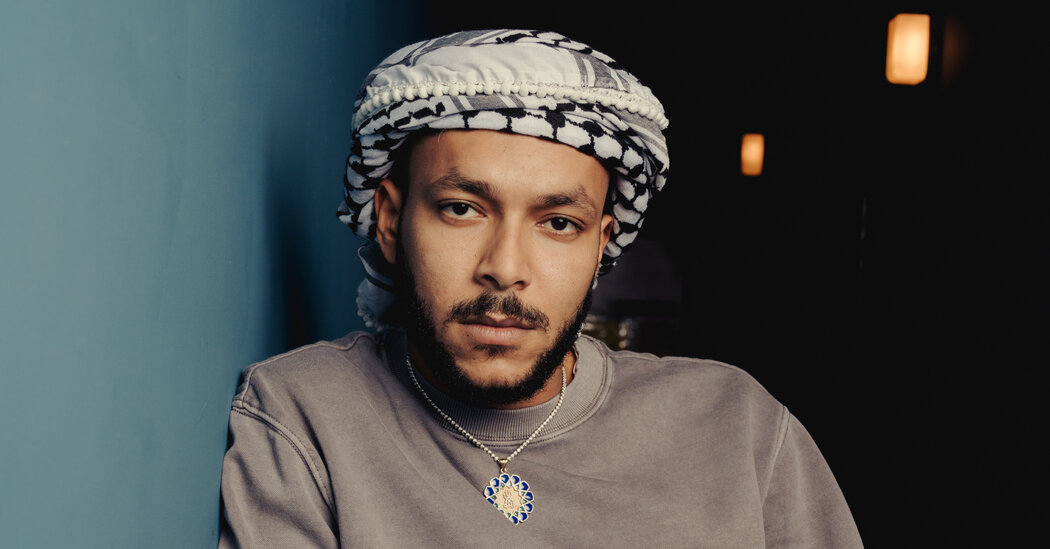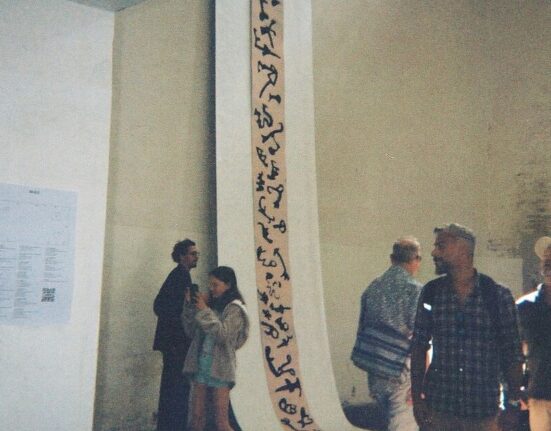On the ninth stop of his first world tour, the Egyptian rapper Wegz finished soundcheck at the Howard Theater in Washington, D.C. and relaxed on a worn black leather couch wearing a gray Carhartt fleece jacket and cream New Balance 990 sneakers. In his unflashy attire, passers-by might not have recognized one of the biggest artists in the emerging Arabic music scene calmly awaiting his set time.
“That’s what I’m trying to do,” Wegz, 25, said. “Just revert people back to minimalism.”
His numbers, however, have been growing. Wegz has been the most-streamed artist on Spotify in Egypt since 2020. In 2022, he was named the most-streamed artist on the platform across the entire Middle East and North Africa, and became the first Egyptian artist to perform at the FIFA World Cup final. He sold out concerts in London and Berlin before arriving in the United States last month as the first Arab artist with a global tour backed by the concert giant Live Nation.
“He has been one of the pioneers who have taken Egyptian rap to a different place,” Salam Kmeid, head of content marketing at the regional music platform Anghami, said in a video call from Dubai. (Wegz’s track “El Bakht” is now the most streamed song of all time on the service.) “As an Arabic hip-hop movement, he has taken it to a different scale.”
In the middle of his current tour — after the European leg had wrapped up but before his first dates in North America — the war between Israel and Hamas began. Wegz, who has been outspoken in support of Palestinians, has made it clear that he has no intent of soft-pedaling his views as he works to reach a broader global audience. He recently posted a video on Instagram of a pro-Palestinian rally in New York City, and announced that a portion of the proceeds from his tour will go to relief efforts in Gaza.
“I will raise awareness about the cause along the way and condemn the dehumanizing and killing of Palestinians,” Wegz said in an interview. “I’m hoping to try to heal from all the horrific images I’ve seen in order to start seeing a better life so we can sing and dance and get back to enjoying what we do.”
His rise has coincided with a wave of attention and appreciation for Arabic music. The Palestinian-Algerian rapper Saint Levant’s “Very Few Friends” and the Palestinian-American Lana Lubany’s “The Snake” both went viral on TikTok. On television, shows like Hulu’s “Ramy,” Netflix’s “Mo” and Disney+’s “Moon Knight” heavily feature Arabic music in thoughtful ways.
“I think there’s a lot of talented people around the globe,” Wegz said, speaking in English. “I might be very talented as well.”
Since his debut single “Batalo Fake” (Arabic for “No Longer Fake”) arrived in 2017, with an appearance from his fellow Egyptian M.C. Hesham Raptor, Wegz has been praised for his lyrics, which exude self-confidence while exploring themes around identity and the socioeconomic reality for youth in Egypt’s urban neighborhoods. While hip-hop with trap beats remains his foundation, his tracks also dabble in dancier production and Afropop. His most successful song to date, the uncharacteristically vulnerable “El Bakht” (“The Luck”), features a melodic rap about a brokenhearted lover over a syncopated beat, strings and plucked acoustic guitar.
Despite his strong streaming numbers, Wegz still hasn’t released a full album, though he insists he’s working on one that he plans to put out after his tour. He attributes his success as a singles artist to being a lifelong student of his craft — a voracious listener nerding out about global music cultures.
“I see myself as someone who’s here to show people things they might not have known about because my passion is the research of things, basically,” he said. “I want to know how you guys started this. I just keep digging and digging.”
Born Ahmed Ali and raised in the coastal Egyptian city Alexandria, Wegz grew up in a modest area with his father, a math teacher, and his mother, a nurse and head of a children’s foster home. He has six siblings — some from different marriages — and last year told the Emirati entrepreneur and interviewer Anas Bukhash that he moved frequently as a child but made new friends fast. He added that he had been eager to take risks when his family urged caution (though his mother encouraged him to explore, which expanded his worldview).
He developed a love of books at an early age, and wrote short stories and poems. His first exposure to music came from being surrounded by religious anthems, but as a teenager he branched out on his own, seeking secular music.
“I tried to go online and go to internet cafes and listen to YouTube,” he recalled in the basement of the Washington venue. Wegz has said he grew up listening to American rappers including Young Thug, Future and the duo Mobb Deep, as well as the Egyptian singers Ahmed Adaweyah, Dalida, and Mohamed Mounir, and the Algerian musician Cheb Mami.
His taste is eclectic, he pointed out, noting that he has “had a phase of every type of music in my life at least once.” (His current passion? Yemeni music, which emphasizes narratives: Even if an artist is “just staring at the tree, there’s a song for it where you can actually tell us how you feel about this tree and how you feel about being outside today.”)
After some attempts at writing music, Wegz recorded his first song at 17 to have something private he could “share on his phone” with a handful of his friends. Working in a studio for the first time “was amazing,” he said. “It was what I wanted.”
Just a few years later, he was getting attention in Egypt with “T.N.T.”, a haunting track produced by fellow Alexandrian rapper L5VAV that blends heavy trap percussion with Egyptian mahraganat, a style that combines low-fi, minimalist synths and edgy, heavy bass. (“I’m a big boss shaking up this great hall/I go heavy on that beat like I’m Rick Ross,” Wegz boasts in the song.) In 2020, “Dorak Gai” (“Your Time Is Coming”) — an aggressive but subtle diss track produced by the powerhouse Egyptian musician Molotof — put Wegz on the map throughout the Middle East and North Africa.
Wegz gave credit to L5VAV, a frequent collaborator who appears on their hit “Khod w Hat” (“Take and Give”), for helping him hone his lyrical skills and navigate his early rise. “He helped me take music seriously,” Wegz said, with affection. “It was very motivating being around such an inspiring character.”
Now he’s set his sights on reaching listeners beyond the Arabic-speaking world while still emphasizing genuine Arabic sounds and rhythms in ways that push the culture forward. “If the global eye is on you right now,” he said, there’s an opportunity to spotlight “the old things that we always had.”
Kmeid, of the streaming service Anghami, said Wegz plays a vital role in Arabic music, and beyond. “He is actually the voice of his generation,” she said. “We do see how the Egyptian scene specifically sees Wegz as that young artist who came out of whatever background or history he had, a very simple person who really believed in his dream.”
Wegz has plans to expand his brand beyond music, looking toward designing merchandise and a career in acting. Arabs have a rich history as traders, he explained, and that’s something he’s always kept in mind.
“For now, I’m making music because I really love it and I have fun doing it,” he said.
“People have fun listening to it, and I’m making money out of it. This is amazing.”
“Overall,” he added, “I hope to always use my voice for good as long as I live.”







